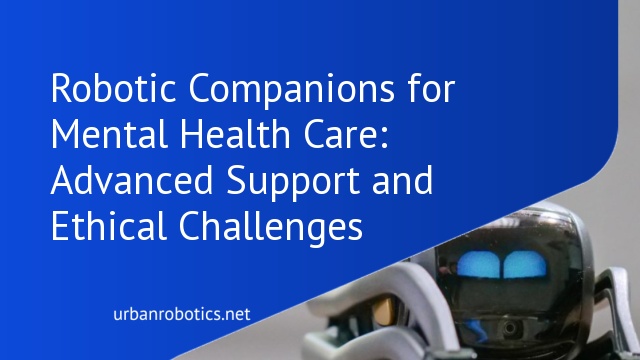Understanding Robotic Companions
Robotic companions in mental health care have transformed how we approach emotional well-being. Here, we’ll explore their definition and evolution.
Defining Robotic Companions
Robotic companions are autonomous devices designed to offer emotional and social support. These robots engage users in interactive dialogues, recognize emotional cues, and provide calming responses. Equipped with AI and machine learning, they adapt to individual needs and preferences, making them essential in personalized mental health care.
Evolution of Robotic Companions
Robotic companions have evolved significantly. Early models, such as simple chatbots, provided basic interactions. Now, advanced robots like SoftBank’s Pepper and Paro the Seal use sophisticated algorithms to understand and respond to human emotions. This shift from basic interaction to personalized emotional support underscores their growing role in mental health care.
Impact on Mental Health Care
Robotic companions significantly influence mental health care, providing unique benefits and facing certain limitations. Some notable case studies further illustrate their impact.
Benefits
Robotic companions offer consistent emotional support. Unlike human counterparts, they provide non-judgmental interactions 24/7. Robots like SoftBank’s Pepper help reduce feelings of loneliness by engaging users in conversations and recognizing emotional cues. They assist therapists by offering consistent data, ensuring better monitoring of patients’ mental health over time.
Limitations
However, robotic companions face challenges. They can’t fully replicate human empathy and understanding. Their effectiveness may be limited by technological constraints, such as recognizing complex emotions or cultural nuances. Additionally, the cost of high-quality robots like Paro the Seal can be prohibitive for widespread adoption, limiting access for many potential users.
Case Studies
In a case study, elderly patients using Paro reported reduced stress and improved mood. Another study involving Pepper with autistic children showed enhanced social interaction skills. Clinical trials in Japan demonstrated that robotic companions alleviated depressive symptoms in adults. These examples underscore their potential but also highlight the need for further research and development.
Key Features of Effective Robotic Companions
To provide meaningful support in mental health care, robotic companions must incorporate several key features. These features ensure that robots can offer effective, personalized emotional support to users.
Artificial Intelligence and Machine Learning
Effective robotic companions use artificial intelligence (AI) and machine learning (ML) to analyze user behavior. AI enables robots to recognize patterns in speech and actions, while ML adjusts responses and behaviors based on user interactions. These technologies help create personalized experiences. For instance, AI-powered chatbots like Woebot employ natural language processing to engage users in therapeutic conversations.
Human-Robot Interaction
Successful human-robot interaction (HRI) is crucial in mental health care. Effective HRI ensures users feel understood and supported. Robotic companions maintain eye contact, use gestures, and respond to emotional cues like humor or sadness. SoftBank’s Pepper employs these techniques to engage users emotionally. Non-verbal communication is key, with robots responding promptly to maintain the user’s trust and engagement.
Customization and Adaptability
Customization and adaptability are essential features. Robotic companions adapt to the needs of individuals, considering preferences, habits, and emotional states. For example, Paro the Seal adjusts its behavior based on user interactions, offering tailored responses. These robots continually learn and adapt to offer more precise support over time, enhancing effectiveness in mental health care settings.
Popular Robotic Companions in Mental Health Care
Robotic companions play crucial roles in mental health care. Various models cater to different needs, offering unique features for effective support.
Notable Models
Several notable models stand out in mental health care. SoftBank’s Pepper, a humanoid robot, engages users through conversation and emotional recognition. Paro, the therapeutic seal robot, provides comfort with tactile interaction, mimicking a real pet. Then there’s Jibo, a social robot designed for home environments, offering companionship and reminders for daily tasks. Each model showcases specific strengths in providing mental health support.
User Experiences and Reviews
User reviews highlight the benefits of these robotic companions. Individuals using Pepper note its conversational abilities and emotional understanding. Paro users appreciate its calming presence, often likening it to having a comforting pet. Jibo’s users find it helpful for daily routines and enjoy its interactive personality. Despite some limitations in replicating human empathy, these robots receive positive feedback for their supportive roles in mental health care.
Ethical and Privacy Considerations
Modern robotic companions raise significant issues related to ethics and privacy in mental health care.
Data Security
Data security remains a paramount concern. Robotic companions gather vast amounts of personal data, including emotional responses and daily routines. This data must be protected to prevent unauthorized access. We need robust encryption protocols to secure information. Additionally, compliance with regulations such as the Health Insurance Portability and Accountability Act (HIPAA) ensures data remains confidential. Companies and developers should implement strong security measures before deploying these robots in mental health settings.
Ethical Implications
Ethical implications also arise with robotic companions. Concerns include dependency, consent, and the scope of robot autonomy. Users might become overly reliant on these robots, which could affect their interpersonal skills. Accurate consent must be obtained before data collection and interaction. Moreover, we must define clear boundaries for robotic actions to prevent them from overstepping ethical limits. Developers should consider these factors to ensure that robots support mental health care responsibly and ethically.
Future Prospects
Robotic companions could revolutionize mental health care in the future. Ongoing advancements promise to enhance their capabilities and integration in various therapeutic settings.
Innovations in Technology
Technological advancements could enable robotic companions to offer more personalized mental health support. Machine learning algorithms may allow these robots to learn user preferences and behavioral patterns, enhancing their interaction quality over time. Enhanced AI can provide better emotional recognition, offering more accurate responses tailored to individual needs. For example, robots might integrate seamlessly with smart home devices, enabling a holistic approach to mental health care.
Potential Challenges
Despite promising advancements, several challenges remain. The high cost of advanced robotic companions might limit their accessibility for many users. Developing robots that navigate complex human emotions and diverse cultural contexts remains difficult. Ethical concerns around user data privacy and security persist. For instance, ensuring that these robots comply with regulations while maintaining user trust is crucial. We must address these issues to fully realize the potential of robotic companions in mental health care.
Conclusion
Robotic companions hold immense promise for revolutionizing mental health care. Their ability to offer personalized support and recognize emotions can significantly enhance patient well-being. As technology advances, these companions will likely become even more effective. However, we must address challenges like high costs, complex human emotions, and data privacy to fully harness their potential. By focusing on these areas, we can ensure that robotic companions become a valuable asset in mental health care, providing much-needed support to those who need it most.





